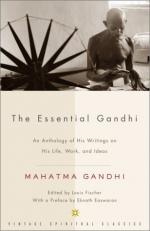
|
| Name: _________________________ | Period: ___________________ |
This test consists of 15 multiple choice questions and 5 short answer questions.
Multiple Choice Questions
1. Was Gandhi's personal life as successful as his public life?
(a) Mostly.
(b) No.
(c) Part of the time.
(d) Yes.
2. By the time Nehru left the ashram, Fischer could detect that Nehru was being won over, later becoming a stronger advocate of____________ than Gandhi himself.
(a) Lessening the civil disobedience.
(b) Shortening the civil disobedience.
(c) Ending the civil disobedience.
(d) The civil disobedience.
3. What did temples do for the untouchables?
(a) They opened their doors to them.
(b) They ignored them.
(c) They gave them food.
(d) They provided shelter for them.
4. Were the odds against Gandhi?
(a) Yes.
(b) No.
(c) Maybe.
(d) Probably not.
5. On February 22nd, Gandhi's dear wife, Kasturbai, died in prison, her head on his lap. From that time until his death, how did he honor her?
(a) He celebrates her birthday.
(b) He says prayers for her every day.
(c) He speaks to her.
(d) He says prayers on the 22nd of every month.
6. What did Gandhi think about Christ?
(a) He believed him to be the Messiah.
(b) He admired him.
(c) He believed him to be an imposter.
(d) He detested him.
7. With what was Fischer amazed, regarding Gandhi?
(a) His fitness.
(b) His frailty.
(c) His speech.
(d) His intelligence.
8. Gandhi had discussions about what with the jailed and jailer alike?
(a) Religion and other matters.
(b) Peace.
(c) Hinduism.
(d) Freedom.
9. He worked effortlessly to quell the violence and promote peace and love to whom?
(a) The warring Indian economic groups.
(b) The warring Moslem sects.
(c) The warring Hindus and Moslems alike.
(d) The warring British and Indians.
10. Gandhi failed to win India's freedom while in London. How did the masses greet him when he returned?
(a) Like a victor.
(b) Like a failure.
(c) Like a lost relative.
(d) Like a stranger.
11. The next day, Hindu officials presented the plan to whom?
(a) British officials.
(b) The Prime Minister.
(c) The Indian Congress.
(d) Gandhi.
12. Through the years, Gandhi had grown increasingly critical of what?
(a) Hinuism.
(b) The West.
(c) Religion.
(d) The East.
13. Nehru told Fischer privately that he was hopeful that Gandhi could work out a settlement with whom?
(a) His ashramites.
(b) The Indian Congress.
(c) The British viceroy.
(d) The British Prime Minister.
14. A renewed effort on England's part was borne from what?
(a) A renewed patriotic duty.
(b) Boycotts in India.
(c) The installation of new government officials.
(d) Violence in India.
15. A compromise was proposed wherein the Harijans would be able to do what?
(a) Hold primaries to select Harijan candidates.
(b) Buy property.
(c) Vote.
(d) Live in India.
Short Answer Questions
1. Churchill would crush what in order to save England and keep it as it had always been?
2. The British officials recommended __________, and the establishment of a central government along with provincial governments that would have sweeping authority.
3. The author describes Gandhi as the most ________ man on earth.
4. What did Gandhi decide to do again?
5. What was Gandhi's passion?
|
This section contains 508 words (approx. 2 pages at 300 words per page) |

|




